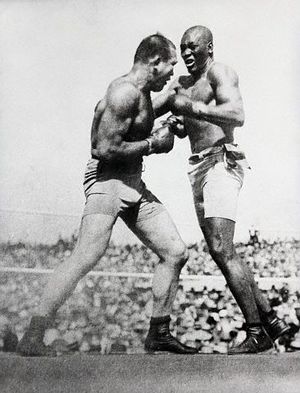
Senator John McCain is leading the charge to get President Obama to pardon boxing legend Jack Johnson. Sen. McCain appeared with members of Johnson's family and documentarian Ken Burns yesterday to unveil a resolution that calls for a presidential pardon for the former heavyweight champion.
Before Floyd Mayweather, before Tyson, Holyfield, Foreman, Fraiser, Ali and Joe Louis, there was Jack Johnson. Johnson had a larger-than-life persona, and was ahead of his time. Born in Galveston, Texas in 1878, Johnson grew up in the Jim Crown South and reached his professional peak during one of the most turbulent times in American history.
Between 1912 and 1920, the U.S. Constitution was amended four times, more than any other 8 year stretch U.S. history. Such amendments included creation of federal income tax, women's voting rights, and Prohibition; pretty drastic changes to the landscape. Jack Johnson battled racism and hatred inside and outside of the ring his entire career. Many of his white counterparts refused to fight him A. for fear they might lose, and B. because mixed race fights were illegal in the South.
Johnson became the first African-American heavyweight champion in 1908 after defeating Tommy Burns in a 14 round bout, in front of 20,000 people in Sydney Australia. Almost immediately, a cry came out from whites to find a "Great White Hope," a white boxer who could challenge and take the title from Johnson. Johnson fought in a series of exhibition bouts against hyped up "Great White Hopes," but a serous contender did not step up until 1910. That year, former heavyweight champion Jim Jeffries, a retired boxer for five years dusted off his gloves and stepped up to challenge Johnson in what has been called The "Fight of the Century."
The fight took place in front of 22,000 people on July 4, 1910 in Reno, Nevada. Think about that for a minute. Independence Day 1910, and a black man as the champion is about to fight the "Great White Hope." Despite the fact that he held the title, Johnson was an underdog by many accounts. The fight, which was broadcast nationwide on the radio had stirred racial tensions, and after knocking Jeffries down twice in 15 rounds, the fight was called and Johnson was delcared the winner. Johnson earned $225,000 for the win, a hefty amount by 1910 standards. Race riots ensued around the nation, and when all the fighting ended 23 blacks and 2 whites had died. Filmmakers documented the fight and produced a widely distributed feature film. As a result, Congress banned films of prizefights from 1912-1940 to prevent images like those of Johnson defeating Jeffries from being seen by a large audience.
When it became obvious that Johnson could not be easily defeated in the ring, efforts were made to defeat him outside of it. Johnson's larger-than-life persona caused him to defy conventional wisdom and mock the social norms of the day. Johnson regularly dated and married white women. Following the suicide of his first wife, Johnson married Lucille Cameron on Decmeber 4, 1912. Cameron was a prostitute, and news of the marriage infuriated many people. The government sought to convict Johnson for violating the Mann Act, which banned interstate transport of females for 'immoral' purposes. To avoid prosecution, Johnson and Cameron fled to France where they lived for seven years until Johnson came back to the states to serve his one year jail sentence. For a long time, Jack Johnson's conviction has been viewed as a racially motivated message from the government to black men regarding their relationships with white women. It is that one year sentence that Senator McCain and others are trying to get pardoned.
As I sad before, Jack Johnson was a larger-than-life character. He battled opponents, racial prejudices, and social norms inside and outside of the ring, most times emerging triumphantly. His contributions and sacrifices, while incendiary at times, paved the way for the boxing legends to achieve unimaginable successes in the decades following the early 1900's when Johnson fought. America would not see another African American compete for the heavyweight title again until Joe Louis did in 1937.
The quest for a presidential pardon for Jack Johnson began in 2004, and was revived again in 2008 when resolutions were given to the Bush administration but never voted on. Posthumous presidential pardons are rare, and there have only been two in the last 10 years. If President Obama pardons Jack Johnson, the first African American President would pardon the first African American heavyweight champion. What a difference 100 years makes...
Below is a small feature ESPN did on Jack Johnson's life.






No comments:
Post a Comment
Note: Only a member of this blog may post a comment.